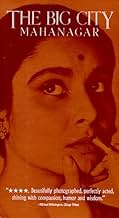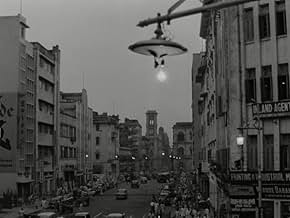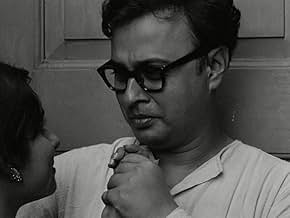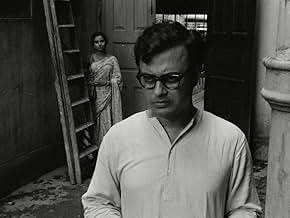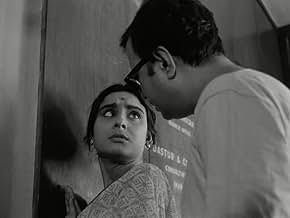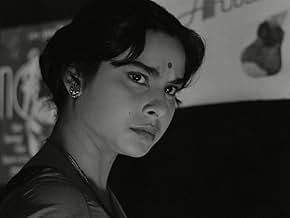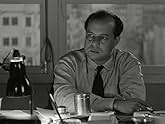IMDb RATING
8.3/10
5.3K
YOUR RATING
Life at home changes when a house-wife from a middle-class, conservative family in Calcutta gets a job as a saleswoman.Life at home changes when a house-wife from a middle-class, conservative family in Calcutta gets a job as a saleswoman.Life at home changes when a house-wife from a middle-class, conservative family in Calcutta gets a job as a saleswoman.
- Director
- Writers
- Stars
- Awards
- 4 wins & 1 nomination total
Madhavi Mukherjee
- Arati Mazumder
- (as Madhabi Mukherjee)
Jaya Bachchan
- Bani
- (as Jaya Bhaduri)
Sefalika Devi
- Sarojini (Subrata's Mother)
- (as Shephalika Devi)
Haradhan Bannerjee
- Himangshu Mukherjee
- (as Haradhan Banerjee)
- Director
- Writers
- All cast & crew
- Production, box office & more at IMDbPro
Featured reviews
10zetes
If, at some point in the future, Pather Panchali cannot fulfil its duties as Satyajit Ray's masterpiece, Mahanagar can step up and fill in the position. Or perhaps the two films can co-rule, as they compliment each other so nicely. Pather Panchali is the simple, straightforward masterpiece and Mahanagar is the more ambitious and complex work. The first is Ray's La Strada and the second his La Dolce Vita.
The Big City is a subtle, flowing work about a young housewife (Madhabi Mukherjee, who would also star in Ray's Charulata) in a middle-class family who finds a job when her father-in-law needs a new pair of spectacles. The family is very conservative, and this upsets everyone. Her husband's manhood is somewhat insulted, her father- and mother-in-law (who both live with the married couple in a rather small apartment) feel that it's just not right, and her son thinks he's been forgotten. The only one who supports her is her younger sister-in-law; she sees her as a role model. The husband (Anil Chatterjee) tries to get her to quit, but, when he loses his own job, he changes his mind quickly. Now she becomes the breadwinner, and he is effectively castrated.
This could have been a little, humble film, like many of Ray's works. But here he decides to examine a huge portion of his own culture, setting up many opposites and studying them closely. We have the husband and wife, man and woman, old-world conservatism and new-world progression, young and old, employer and employee. The list goes on. The depth of this film is nearly endless, and I'm sure it would hold up to any number of repeated viewings. The only flaw that I can see is a somewhat contrived climax - Ray had this problem in a few of his films.
I do have to give special praise to the two leads. Mukherjee and Chatterjee are just brilliant in the film. The supporting cast is also uniformly excellent.
The Big City is a subtle, flowing work about a young housewife (Madhabi Mukherjee, who would also star in Ray's Charulata) in a middle-class family who finds a job when her father-in-law needs a new pair of spectacles. The family is very conservative, and this upsets everyone. Her husband's manhood is somewhat insulted, her father- and mother-in-law (who both live with the married couple in a rather small apartment) feel that it's just not right, and her son thinks he's been forgotten. The only one who supports her is her younger sister-in-law; she sees her as a role model. The husband (Anil Chatterjee) tries to get her to quit, but, when he loses his own job, he changes his mind quickly. Now she becomes the breadwinner, and he is effectively castrated.
This could have been a little, humble film, like many of Ray's works. But here he decides to examine a huge portion of his own culture, setting up many opposites and studying them closely. We have the husband and wife, man and woman, old-world conservatism and new-world progression, young and old, employer and employee. The list goes on. The depth of this film is nearly endless, and I'm sure it would hold up to any number of repeated viewings. The only flaw that I can see is a somewhat contrived climax - Ray had this problem in a few of his films.
I do have to give special praise to the two leads. Mukherjee and Chatterjee are just brilliant in the film. The supporting cast is also uniformly excellent.
I found the movie exhilarating. This a movie where a Bengali housewife's actual stand in the eyes of those near to her comes to life. The house wife Aarati takes up the load of a job only to care for her family. While other family members gradually accept her new role, mostly because of the dire need of money, its her closest ally in the family, her husband, who isn't very warm to her new role. It first of all hurts his pride to accept her contribution, and he also resents her new found confidence, more than her independence. At the same time, Its the housewife Aarati who passes every test, as she copes with every challenge thrown at her, at home, at work and in her relationships with every individual. Personally i think thats what women are groomed to be, from birth, brave to take on the world whenever necessary. Its the husband who falters and learns to accept her after a big fight within himself.
Satyajit Ray, in Mahanagar, made a movie where ( in terms of cinematography and story-telling) not a single frame is wasted in anyway. Every movement of the actors, every hint relates to something or the other, while the story-telling is still simple enough for the ordinary to follow the story. I would recommend this to anyone.
Satyajit Ray, in Mahanagar, made a movie where ( in terms of cinematography and story-telling) not a single frame is wasted in anyway. Every movement of the actors, every hint relates to something or the other, while the story-telling is still simple enough for the ordinary to follow the story. I would recommend this to anyone.
I haven't watched much of Satyajit Ray's films, but now I strongly have an urge to watch more and more.. My first Ray film was Charulata, which was once screened in our college film club. It too had Madhabi Mukherjee playing the title character, 'The lonely wife'.
After having finished watching Mahanagar, I felt that the lonely house wife I had seen earlier had achieved a sense of fulfillment..a sense of completion.The entire film is a microcosm of an typical urbane family of the 1960's Calcutta. The legendary city of Calcutta in the 1960's has been impressionistic-ally captured with all its charm as well as confusion.We can see some of the best well-scripted, realistic emotional sequences. An young Jayabhaduri too appears as the little sister of Mr. Mazumdar(The main character's husband). Madhabi Mukherjee again dons a intense character and proves her brilliance in acting.Now I have become impatient enough to watch Ray's Calcutta Trilogy and other films too.It is very difficult to get good prints of most of them.
Ray had based this film on Abataranika, a Bengali short story. All the actors have been handpicked-especially Anil Chatterjee and Haren Chatterjee-who played the role of Mr. Mazumdar and his father.The film was well-received at the 14th Berlin Festival and Ray won a Silver Bear for direction. Even though it was rejected at the Oscars, it received an All India merit certificate at the National awards that year.
After having finished watching Mahanagar, I felt that the lonely house wife I had seen earlier had achieved a sense of fulfillment..a sense of completion.The entire film is a microcosm of an typical urbane family of the 1960's Calcutta. The legendary city of Calcutta in the 1960's has been impressionistic-ally captured with all its charm as well as confusion.We can see some of the best well-scripted, realistic emotional sequences. An young Jayabhaduri too appears as the little sister of Mr. Mazumdar(The main character's husband). Madhabi Mukherjee again dons a intense character and proves her brilliance in acting.Now I have become impatient enough to watch Ray's Calcutta Trilogy and other films too.It is very difficult to get good prints of most of them.
Ray had based this film on Abataranika, a Bengali short story. All the actors have been handpicked-especially Anil Chatterjee and Haren Chatterjee-who played the role of Mr. Mazumdar and his father.The film was well-received at the 14th Berlin Festival and Ray won a Silver Bear for direction. Even though it was rejected at the Oscars, it received an All India merit certificate at the National awards that year.
Life at home changes when a house-wife from a middle-class, conservative family in Calcutta gets a job as a saleswoman.
According to Roger Ebert, "the power of this extraordinary film seems to come in equal parts from the serene narrative style of director Satyajit Ray and the sensitive performances of the cast members." He described Mahanagar as "one of the most rewarding screen experiences of our time".
Ebert, as usual, is spot on. This film was a stunning surprise for me. With very few exceptions, I have found the "great" Indian films to be a let down, and the modern Bollywood film is just unbearable. This was, however, a treat and a great exploration of culture. The idea of women working and how that affects the esteem of their husbands is not unique to India, but there are certain themes -- the reaction of her father-in-law! -- that are unlike what you might see in an American film.
According to Roger Ebert, "the power of this extraordinary film seems to come in equal parts from the serene narrative style of director Satyajit Ray and the sensitive performances of the cast members." He described Mahanagar as "one of the most rewarding screen experiences of our time".
Ebert, as usual, is spot on. This film was a stunning surprise for me. With very few exceptions, I have found the "great" Indian films to be a let down, and the modern Bollywood film is just unbearable. This was, however, a treat and a great exploration of culture. The idea of women working and how that affects the esteem of their husbands is not unique to India, but there are certain themes -- the reaction of her father-in-law! -- that are unlike what you might see in an American film.
How does Satyajit Ray manage to evoke such a set of complex emotions with such simplicity? Madhabi Mukherjee delivers a amazingly nuanced, sensitive performance in this tale of personal empowerment. In an odd way, the story of personal triumph reminds me a bit of American films in the 1930s, when the hero struggled against odds and won; this time its 1960's India, at a time when women began to assert themselves simply because men failed to move with the times. I can just imagine a modern Hollywood remake of this film, with sex situations aplenty, lots of screaming and perhaps a stabbing or two! This worthy film about a struggling family attempting to maintain tradition in the face of modernity is subtle, and if you stick with it, involving. That said, this two different DVD versions I could find were hard to stick with, -the subtitles often did not match the picture, were often poorly translated, and the print itself, like so many Satyajit Ray films available in the U.S., looks like an old television print, grainy and too often dark, missing the subtle shades that typify his work. Whoever is in charge of this important film legacy needs to get on the stick and provide the clarity Ray deserves. Invest in the future of this important world filmmaker!
Did you know
- TriviaFifteen-year old Jaya Bhaduri's (later known as Jaya Bachchan) film debut and her only film with Satyajit Ray.
- GoofsWhen Priyogopal (Subrata's father) goes to visit his student Anupam Roychowdhury to ask for money he is shown having a conversation with Anupam in his office. When he is explaining his circumstance the camera shows him only sitting on a chair with his walking stick. In the very next scene when all the three characters are shown (third one being Anupam's wife ) the top of his walking stick has changed direction. The round bit on top was towards the right before and is turned to the left in the very next scene.
- Quotes
Arati: You wouldn't recognize me on the job.
Subrata Mazumdar: What about at home? Would I recognize you at home?
Arati: You don't recognize me? Tell me honestly.
[Subrata shakes his head no]
Arati: Why not?
Subrata Mazumdar: It all feels a bit unfamiliar. It feels a bit...
Arati: What about this?
[points at her cheek]
Arati: You don't recognize my mole? I'm still the same housewife.
- ConnectionsReferenced in Creative Artists of India: Satyajit Ray (1964)
- How long is The Big City?Powered by Alexa
Details
- Release date
- Country of origin
- Official site
- Languages
- Also known as
- The Big City
- Filming locations
- RN Mukherjee Rd, Calcutta, West Bengal, India(closing shot: view of the city)
- Production company
- See more company credits at IMDbPro
- Runtime2 hours 16 minutes
- Color
- Sound mix
- Aspect ratio
- 1.37 : 1
Contribute to this page
Suggest an edit or add missing content



